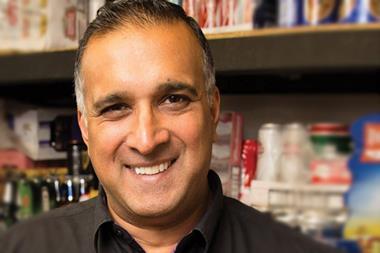Finding and retaining staff can be a tricky and time-consuming business. Our C-Store Champions reveal how they handle the issue
Conrad Davies, owner of four Spar stores in Wales
With 140 members of staff, Conrad believes hiring a HR company to look after this area is a worthwhile investment
Nigel Dowdney, owner of Earlham Shopper and Stalham Shopper in Norfolk
The cost of employment has become a big challenge, Nigel says, along with finding good people
Mandi Duncan, co-owner of two Day-Today stores in Troon, South Ayrshire
Mandi likes to make work interesting for staff to keep morale up, including holding fancy dress days
Ramesh Shingadia, owner of two stores in and around Horsham, West Sussex
Potential staff do trial shifts at Ramesh’s stores so both sides can see whether the job will work out
How many members of staff do you employ and how much has this number changed over the past few years?
Conrad: We employ 140 people and this has changed quite significantly over the past few years. Five years ago we added a Subway to some stores and we recently added post offices, plus we acquired another petrol station in April this year.
Nigel: We employ 28 members of staff. This number has fallen dramatically as the cost of employment has increased. Some 30 years ago the cost of employment would have been 8-9% of our turnover, whereas now it’s more like 14%. Wages are the most expensive cost we have to deal with and the only way we can try to reduce this is by cutting our staff numbers and cutting their hours.
Mandi: We employ 18 people between the two stores. I’ve got a new starter at the moment and we got another new girl who started about six weeks ago. We brought her in for the summer, but we are still so much busier than normal that we needed another member of staff.
Ramesh: We have 28 members of staff across the two stores. This has greatly increased over the past few years. We started with the one store then we took on the second store, starting with three members of staff there. Now we’re up to 12 as the store has evolved and been so successful.
How do you ensure staff are well trained? What’s the hardest part of the training process?
Conrad: Subway has its own university programme via an online portal and so does Spar. Training isn’t something I’m personally involved in and I don’t carry out the interviews myself either. I know when they do the interviews they are looking for someone who is well presented, polite and engaging. They have to speak to customers so these things are important. It can be difficult if you have a very shy member of staff, but putting them on the tills is the best way to force them to talk to people and you quickly see them coming out of their shell and becoming much more confident. It’s not a great idea to leave a shy person working on the shop floor where they won’t be encouraged to speak to anyone. Someone on a Subway counter has no choice but to speak as they have to ask a million questions just to make a sandwich. I don’t think schools and colleges are as good as they used to be in improving young people’s confidence and communication skills. Social media and computer games just make things worse; people don’t have to interact with other people at all. No one wants to speak any more. I can never get hold of staff on the phone – the best way to get through to them is with a message on Facebook.
Nigel: We pay for members of staff to do training courses so that they can continue to progress. We had a lot of local school kids come to work with us once they’d finished school and that’s a good time for them to get some extra qualifications under their belt. These aren’t cheap, they can cost anything from £600 to several thousand pounds.
Mandi: I like to do the training myself and then I can give one-to-one attention. I take them through everything and am very specific about the way I like things to be done. I’m very open and I let them know they can come to me any time if they have a question. If I’m at home they can call me and I’ll come in and help them, they don’t need to feel worried. It involves patience but I haven’t had to be too patient yet.
Ramesh: We tend to train them up on the job with a mentor in our stores. But we will always have them work a couple of covers before officially employing them as we like to have the opportunity to see what their strengths and weaknesses are, and it’s also an opportunity for them to tell us if they don’t think the job is for them. Younger recruits tend to be quite au fait with technology and IT systems so they tend to be easier to train in that respect, whereas some older recruits might find that area harder to pick up.
How do you deal with any misconduct?
Conrad: We pay a HR agency £700 a month to sort all our HR issues for us. When you think this is to look after 140 members of staff that doesn’t seem too bad and I think it’s well worth the investment to avoid doing anything wrong and getting into any sort of law suit. We had one lad call in sick two Saturdays running so the HR people will be chasing him up, and we had another lad come to work drunk three weeks ago. We suspended him for two weeks and then he didn’t show up for his return interview, so now he’ll be fired. It’s good having an outside body to carry out this work as it shakes up the staff a bit more as it feel very official, and I think it feels more serious when an outside body has had to get involved.
Nigel: I’ve heard every excuse in the book for absences. I do believe people can sometimes think, because we’re a small business, they can take advantage. I try to instil the message that they are part of a team and are letting down their team when they call in sick.
Mandi: At the beginning we were recommended a girl, who later stole from us. It was a punch in the gut, and horrible to find out someone could do that to us. I would always give her lifts to and from work and one day I came and helped her close up shop and then gave her a lift home. While I was in the car she quickly popped back into the shop. I got a funny feeling about her so I looked at the CCTV the next day and saw that she’d gone in and put a bottle of wine in her bag. I spoke to her and told her what I’d seen and she said she had planned to pay for it. Obviously she had to go. Her parents have always been great customers of mine so it was a bit awkward when they found out, but it’s all fine now and they are still customers. Apart from that, everyone’s been great.
Ramesh: We did have an incident where a member of staff was accusing other employees of mistreating her, but we found that she was lying. We spoke to her and gave her a written warning and she hasn’t done it since. This was a tough situation because we felt that we should help her, psychologically, as she clearly was feeling a little unstable to have made all those accusations. We spoke to the NFRN and other employment agencies to get their advice on the best ways to help her. It can be tough when you are torn between wanting to help your staff, but also needing to make sure you’re doing the best for your own business.
What’s the toughest aspect of employing staff?
Conrad: We are struggling to recruit staff at the moment. For the past six months, I’d say, we just can’t find anyone who wants to work. A New York grill chain restaurant just opened over the road and they’ve had to get people to commute from other branches to work there as they can’t find anyone from this area to employ.
Nigel: The toughest aspect of employing staff is the cost; trying to keep on top of the cost when wages keep going up.
Mandi: The hardest part is probably the boring part – the admin and making sure we are following protocols.
Ramesh: The hardest thing is definitely staff retention, especially with the multiples all offering a premium on the National Living Wage. Brexit also concerns me as a lot of members of staff that independent retailers employ are European nationals so Brexit could potentially greatly reduce the pool of job applicants.
Recruitment
How do you advertise vacancies?
Conrad: We used to use the Job Centre, but they would send us the dregs of applicants whom you know are applying only because they have to. They wouldn’t even be worth giving an interview. Now we use Facebook, which usually works quite well, and we put posters in our shop windows.
Nigel: We always look locally for staff and so we advertise vacancies in the local paper and put up posters in the shop. Some 20 years ago if we put an advert in the paper we would get 200 replies. The last ad we put in brought us just eight replies. I do still think it’s worth using that service, though, because they put it on their online job site as well as in the paper itself.
Mandi: We don’t really advertise job vacancies. We will sometimes put something up on Facebook, but generally we can rely on word of mouth. People will come in and let us know if they are looking for work, or if they know someone looking. This way we get genuine personal recommendations, plus we are such a close-knit community that we all know one another. It was a funny story with the last girl who started: I was on the phone to a girl who had been delaying her start date for a long time and I eventually had to tell her we couldn’t wait any longer and would have to employ someone else. At that moment there was a girl in the store I didn’t recognise and I jokingly said ‘You don’t fancy working here do you?’ and she said ‘Actually, I’m just moving into this area tomorrow and I will need a job’. She started a day after she moved here, and she’s worked out great. I tend to go on gut feeling as to whether I think someone will be good for the job and that gut feeling is usually right.
Ramesh: We use the online site Indeed, which gets us the biggest response. This is a free and simple service to use. It lets us read applications and quickly reply to people to let them know if we’d like to discuss their application. We do also put a post on the local community Facebook page as well as the store’s Facebook page. We occasionally advertise vacancies in the store, but this can make things complicated as you might have a regular customer apply and it can then be awkward if you turn them down.
Staff morale
How do you keep a positive staff morale?
Conrad: I always hold a Christmas party for the staff. They’ve all been telling me how hard they’ve been working in this warm weather and that they want an end of season party, so I will be doing one of those as well. It will be a night out with everything paid for. They appreciate those sorts of things. I’m also a very laid-back boss and am flexible in the way I work, so if someone needs to take time off then I will look to accommodate this. I think having this attitude helps to keep your staff happy as they feel they are being treated fairly.
Nigel: We have regular nights out where we’ll do things like 10-pin bowling. The nights out cost me a fortune, but I do think they are worth it as improves team morale. I also like to give them a section of the shop to look after. So if someone looks after biscuits then they will make sure that section is well stocked and rotated and will do the ordering. This did lead to a problem once when a girl was trained for months to do this, but I noticed that our profit margin was reducing in this section. I later discovered she had over-ordered sweets and then hidden them at the back of shelves. Usually when we see profits drop off like that it’s because of theft, but this was a rather unusual situation. We tend to go through periods of high turnover and periods where everyone stays. It tends to depend on the job market and if there are a lot of employment options out there, as there are at the moment. For that reason it’s harder to find good people at the moment.
Mandi: I think it helps that we always keep things interesting and every day is different in the store. We have lots of events and fancy dress days and we have quite a lot of fun in the store day to day. I hold nights out for the team as well, but there’s always quite a long time between these so we need to keep morale high from day to day. We do warn staff during the interview that they’ll be asked to dress up but all the staff enjoy it. I could tell them all we are going to be bees next Wednesday and the next thing I know they will all have bought costumes.
Ramesh: I’m quite lucky that a lot of the members of staff in our Southwater store have been there for a long time and there’s a naturally strong bond between them as they’re like a big family. In the newer store, there are a lot of younger members of staff, but they all get on really well and are frequently arranging nights out together. I organise nights out every now and then, but they organise a lot themselves, too. I’m lucky that they seem to genuinely enjoy spending time with each other, which makes work much more enjoyable.























![C-Store_Champions_logo-CHOSEN[1] 2023](https://d2dyh47stel7w4.cloudfront.net/Pictures/380x253/6/5/7/301657_cstore_champions_logochosen12023_817064.jpg)




No comments yet